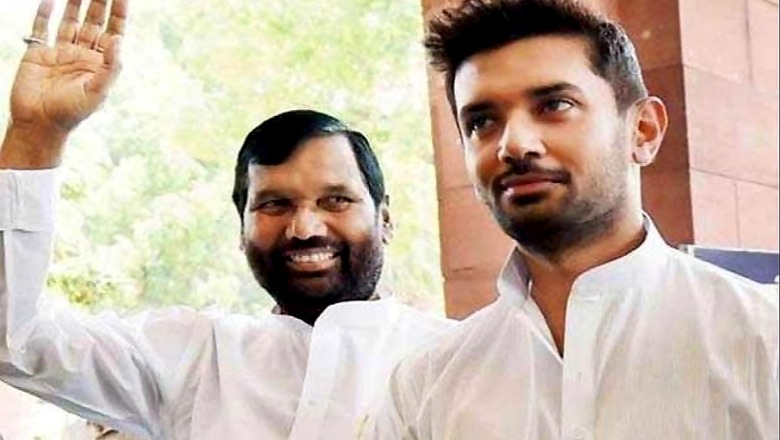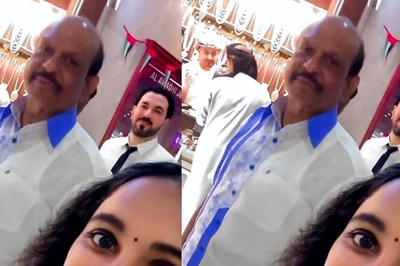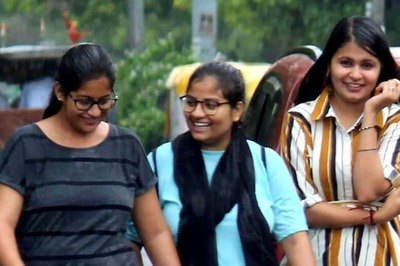
views
Leadership transitions have been problematic and painful in family-centred political parties, with rare exceptions. The family’s patriarch, who is also the founder of a party in many cases, would ideally like to pass the baton to an offspring and it’s always better if it’s a firstborn male progeny, in keeping with the ancient rights of primogeniture. However, as politics gets more competitive and less hidebound, the laws of inheritance governing dynastic shifts aren’t necessarily adhered to and challenges have emerged from the immediate or extended families of the head.
Uttar Pradesh classically typified the process of a messy generational change in the Samajwadi Party (SP), founded by Mulayam Singh Yadav in 1992. In 2012, before an assembly election, Mulayam anointed his son from his first wife, Akhilesh Yadav, as his political heir and projected him upfront in the electioneering without officially naming him as the chief minister. The SP won and Akhilesh got the top job. For the five years he ruled, his leadership was under no threat. When he was voted out in 2017, the fault lines in the family surfaced. Mulayam’s son from his second wife, Prateek, let on his ambitions, egged on by Aparna, his politically inclined spouse. Mulayam’s younger brother, Shivpal Singh, who put together the SP’s organisational nuts and bolts, made it manifestly clear he was not there as Akhilesh’s permanent aide. Shivpal nurtured plans to groom his son Aditya, who like him demonstrated organisational skills and a capacity to mobilise workers.
By the time the 2017 elections took place, Shivpal split and floated his own party, the Pragatisheel Samajwadi Party (Lohia). The fledgling party gained nothing, but irreparably damaged the SP in the family borough in Etawah and Mainpuri in west-central UP and helped the BJP. In the two years before the next Lok Sabha polls in 2019, despite occasional interventions by Mulayam, Akhilesh and Shivpal refused to patch up. Akhilesh leaned more on Ramgopal Yadav, Mulayam’s cousin, for political advice and kept him on as a Rajya Sabha MP, despite murmurs from within the SP. The incipient sign of reconciliation with Shivpal was visible in the recent panchayat polls in which the two antagonistic sides came together on the family turf and swept the region.
Also read: Pashupati Kumar Paras Elected as LJP Leader in Lok Sabha as Chirag Paswan Faces Revolt from Party MPs
History repeated itself in Bihar, UP’s neighbour, with some variations. The protagonists are the Lok Janshakti Party (LJP) and its president, Chirag Paswan. Chirag’s anointment as the leader of LJP by his father and party founder, Ram Vilas Paswan, was apparently smooth. It was assumed that Chirag, a one-film Bollywood actor, was the natural heir. When Paswan senior suffered a serious heart condition in 2011, he called it quits. He brought in Chirag although his brothers, Ramchandra Paswan and Pashupati Nath Paras, were seasoned politicians who, in a sense, had grown with Paswan senior and the LJP, and had become the party’s backbone. Ramchandra died in 2019, a year before his older brother Ramvilas. But like SP’s Shivpal, he too had ambitions for his son and Lok Sabha MP Prince Raj that obviously remained unrealised in his lifetime.
Paswan senior earned the moniker of a “mausam vaigyanik” for accurately divining political trends, an attribute that made him switch sides before every election on the back of the Dalit support he commanded in Bihar and become a part of every coalition government. Chirag displayed his father’s trait at the beginning of his political innings. In 2013, he guessed the BJP and Narendra Modi were ascendant, the Congress was downhill and, therefore, it made sense for the LJP (which was not part of UPA II) to smoke the peace pipe with Modi. Paswan senior severed ties with the BJP (he was part of Atal Bihari Vajpayee’s NDA government) after the 2002 Gujarat communal violence, making Modi the reason for quitting. Chirag persuaded Paswan senior to jettison the past. He made up with Modi, fought the 2014 elections with the BJP and won six of the seven seats the LJP was given. Chirag debuted in the Lok Sabha from Jamui.
Chirag’s political instincts were blunted thereafter. He didn’t have a realistic assessment of the LJP’s ground strength and hastily decided to take on the BJP after the fiasco in Maharashtra, following the 2019 polls. Chirag asked for an NDA coordination panel to be set up to allow the constituents to have a greater say in the Centre’s policies and plans. When his demand went unheeded, he put up an LJP MP, Mehboob Ali Kaiser, to unblock the BJP’s intent to stall a discussion on data security and privacy by voting against it in the parliamentary standing committee on Information Technology. The move momentarily embarrassed the BJP, but the government treated it as a parenthesis in the exercise of absolute power.
In his single-minded zeal to confront Nitish Kumar, he sundered the LJP’s links with the Janata Dal (United) and vowed to defeat Nitish in the 2020 assembly polls. The LJP, in concert with the BJP, played a curious game: while the BJP’s alliance with the JD(U) continued, it tangentially fanned Chirag’s fervour to put down the JD(U) and itself emerge as a larger party in the coalition. The LJP fielded 143 candidates in 243 seats, won only one seat, Matihani, but damaged the JD(U) in 35 to 40 seats and served the BJP’s purpose.
Part two of the BJP-LJP-JD(U) saga was curiouser. Far from “rewarding” Chirag in the joint machinations, the BJP left him high and dry. The BJP never made it clear if the LJP was part of the NDA but Chirag was prevailed upon to leave Paswan senior’s Rajya Sabha seat for the BJP which, he now considerably enfeebled, did. The seat went to Sushil Modi, Bihar’s former deputy CM and a close Nitish confidant. The BJP killed two birds with one stone: it disentangled Sushil Modi from his long partnership with Nitish and left the Bihar CM a tad weaker and it placated Nitish by taking away the LJP seat from Chirag.
However, Nitish didn’t take anything lying down. He waited to strike at the LJP. After consolidating his position with the merger of Upendra Singh Kushwaha’s Rashtriya Lok Samata Party in the JD(U), he spirited away the LJP’s lone MLA, Raj Kumar Singh, in April this year. An LJP MLC, Nutan Singh, too quit and joined the BJP. The ground beneath Chirag’s feet was slipping away.
Chirag probably sensed what more was coming. In the LJP organisation, whose Bihar unit was headed by Prince Raj, his cousin, Chirag appointed his confidants Raju Tiwari and Sanjay Paswan respectively as the state working president and principal general secretary.
The final blow was struck by uncle Paras who was deadlier than Shivpal Singh was towards Akhilesh. With the JD(U)’s reported blessings, Paras lured five of the LJP’s six Lok Sabha MPs with him, leaving Chiraj with the shell of a party. Paras refused to meet Chirag. Lallan Singh, the JD(U)’s Munger MP and a long-time Nitish associate, was the architect of Operation LJP. However, it’s not clear if Paras will merge the party with the JD(U) or continue autonomously and strike a bargain with the BJP in the speculated cabinet reshuffle.
For the moment, it’s retribution time for Nitish who demonstrated he has not lost his savvy at playing realpolitik.
Read all the Latest News, Breaking News and Coronavirus News here.




















Comments
0 comment